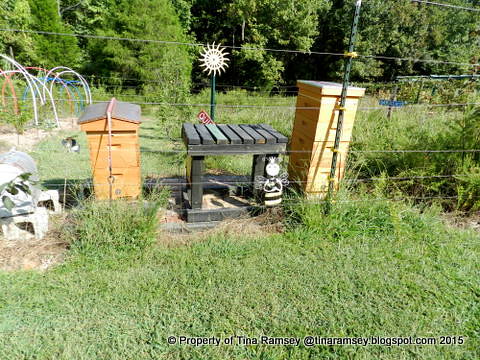
"I think you should go ahead and get some bees Tina. It will be good for you and fun." says Mr. Fix-it. I do love my husband and he is always considering my happiness in all he says and does but perhaps I was a bit disillusioned about beekeeping, and it is all his fault. My revenge is to ask him to help me with the bees. He has obliged willingly, but after he got stung once he is not so obliging anymore. That did not stop my hero from taking pictures during his lesson on beekeeping on this day. And lucky him he did not get stung! Maybe the bee thing will work out for us after all.
Prior to getting into beekeeping I heard a lot of good things about bees. The optimism of everyone I spoke to made me think bees would be easy to care for. As a benefit to beekeeping I would have ready pollinators in my garden and I'd be helping the bees. Hmmmmmm, this is the reality of beekeeping:
It's easy, you only need to spend about 15 minutes a week on beekeeping. Truth: It's more like 30-60 minutes or so per week for me and while that does not seem to be a long time, it really is a long time when in a bee jacket in 90 degree weather.
Bees make their own food. Truth: Yes and no. It all depends on what is blooming that the bees can eat. Even though there are flowers blooming the bees might not be able to use them for pollen or nectar. Case in point, goldenrod has been blooming for quite a while, but the bees apparently did not like the kind blooming and so they preferred to dine at my five hummingbird feeders. That was my clue to feed my bees. Now that the good goldenrod is blooming they've left the hummingbird feeders alone but they still don't seem to have enough to eat so everyone in bee groups says to feed. Feeding is difficult for a good deal of reasons. Not to mention it means I have to get in the hive. Urgh.
Bees are gentle and usually don't sting. Truth: Bees don't appreciate you opening up their house and rummaging around in it. They appreciate it even less when you want to take all their food away. Bees will sting to defend their homes. Who can blame them? If you are a beekeeper expect to get stung. The good news is bee stings are way less painful than a wasp sting and I've been stung by both this summer.
Bees will repay you in spades with honey. You might even get some the first year! Truth: I really had no intentions of harvesting honey this year. It's a good thing too! There really isn't any extra for me. I suspect I may be feeding my bees all winter and that is so not fun. Maybe at some point I'll get honey but each teaspoon will have costed me about $5. Haha, I could just as easily buy honey for a lot less money and let someone else do all the work.
You become one with nature when checking your beehives. Truth: I try ever so hard to really get into a groove and to enjoy checking the beehives. It's true the gentle hum of the bees can be lulling and it is kind of neat conversing with nature. As long as I can get past sweat running down my brow so much that I can't see to do things right and I don't bump a frame or the box and the bees get angry, then yes, becoming one with nature might take effect-might. In the meantime it is a lot of nervousness when in the beehives and not so much enjoyment of nature.
I have two hives because the best advice says to start with two hives. This way I (the beekeeper) can gauge how each hive is doing by comparing the two. In the above picture the hive on the right is doing a LOT better than the hive on the left. There are more bees and they have more stores in those extra boxes and this is amazing since the queen in this hive disappeared early on in the season. I actually had to requeen this hive which can set a hive back. The left hive should be in a better position because it has the original queen and was not set back like the other hive. That is, until I fed the bees and most of the bees in the left hive drowned in their nectar. None of the bees in the right hive drowned. What? Yes, bees are a quandary. Let's look at a beehive check in Tiger Way Gardens.
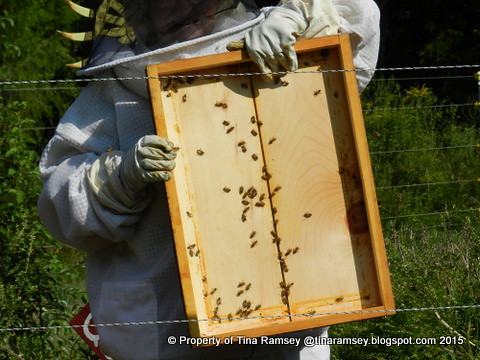
Remove the top cover (after you unstrap the hives--straps are important to keep the hives from blowing over in severe weather). Note all the bees? This is the strong hive and lots of bees are a good thing. Just be sure you have some protection from the bees. There is always one that gets kind of mad you are in their home and that one bee will persist in attacking you by stinging you if she can. My strong hive is the hive that has a bit more aggression issues than the weaker hive. I have gotten to the point of not smoking the bees and with experience I am getting better with hive checks. There is no school like the school of hard knocks and experience and with each check it seems to get easier.
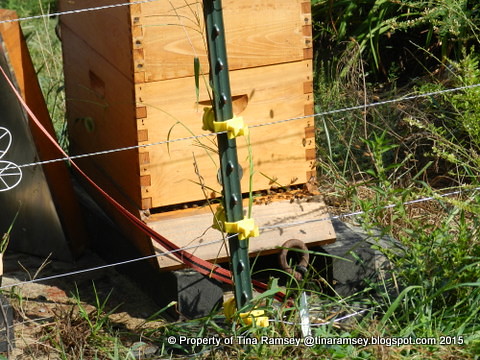
The entry to the strong hive is full of bees busy going about their business. Right now they are loaded with a golden pollen and it is a delight to see. I always check the bees during the day when hopefully more workers are in the field (less bees to worry about bothering me) and when it is sunny outside with no rain predicted.
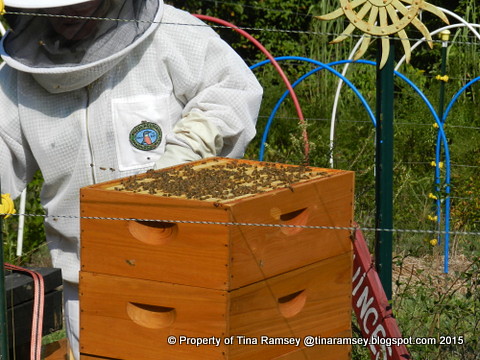
Once the top cover comes off I take off my top feeder (it's empty right now and not shown in the picture), then the inner cover and walah, I am in the hive proper. See the bees? They are working in one of the two supers (honey holding boxes), though there doesn't seem to be much honey in the supers.
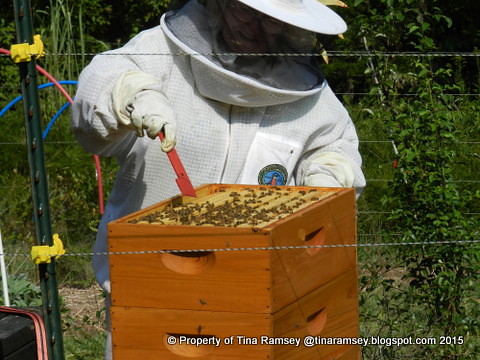
I get my hive tool and try really hard to pry the frames apart so I can remove one. It is a difficult feat to get those frames and boxes apart because the bees glue everything together with something called propolis. Propolis is good for the bees but not so good for the beekeeper. I think if I had to pick my most difficult task when checking the hives it would be to separate the boxes and frames without damaging them so that I can inspect everything.

Aha! One frame removed. I am now checking for honey and drawn comb since this is a honey super and not a brood box. There is some honeycomb on this frame but not as much as I'd like.
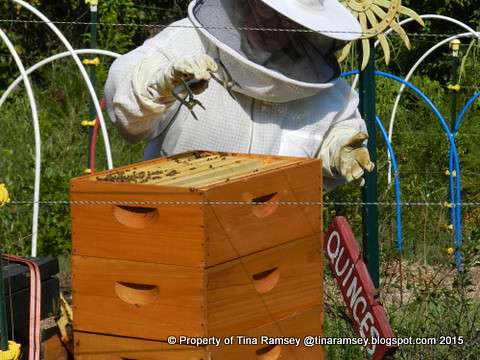
I will sit the first frame down in a safe place on my table then proceed to pull the other frames using my handy frame puller (the steel pinchers you see there). The frame puller is great! I just have to remember to keep a tight grip on it so that I don't drop any frames. When you drop frames the bees get mad and if you drop the frames on grass or the ground the frames will pick up dirt and grass because the propolis just loves debris. This is not a good thing for your beehive.
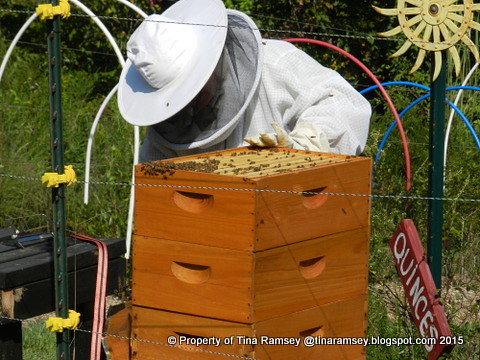
I don't always go through all frames in all boxes but I do try to look for pests, drawn comb, honey stores, and eventually brood once I get lower in the hive.
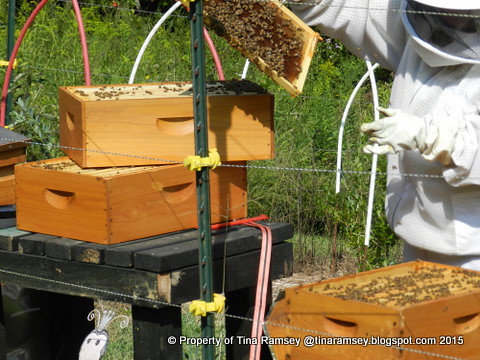
Here I've pulled both honey supers and am getting into the first of two deep brood boxes. These two boxes are theoretically where the queen should be located. In the better than four months I've had the bees I have never found a queen in either hive. One time Mr. Fix-it and my daughter Liz spotted one of the queens and that was exciting for us. It's okay if I don't spot the queen because as long as I find brood and eggs I think I'm doing okay and the queen is also okay.
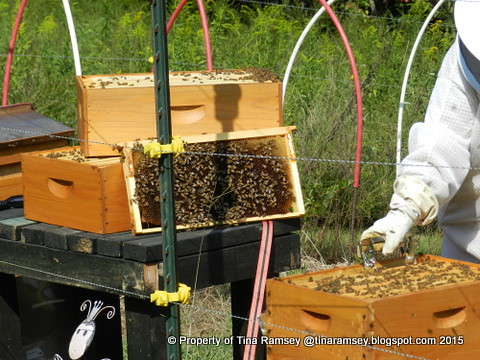
Can you see how dark this frame is? As compared to the frame above that came out of the honey super? The darkness comes from multiple bees hatching out and leaving behind their pupal skin. Apparently they leave behind some skin which attracts wax moths. So far I do not have any problems with wax moths or any other pests of beehives. I am absolutely thrilled this is the case--thus far.
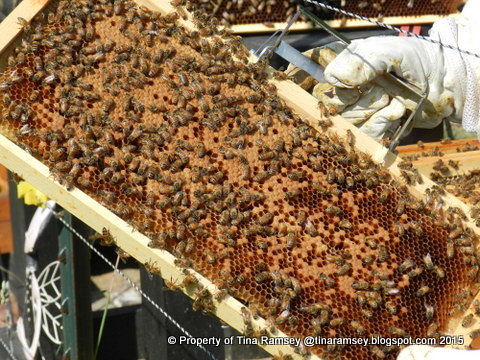
Here is an up close of a frame. I am running eight frame hives. The other type you can run are ten frame hives. The brood boxes in my hives are deeps. As you can imagine these boxes can get heavy so that is why I opted for eight frame hives versus the ten frame hives. Also, my hives are small cell frames. Bees can be large and some small. The natural way of bees is to be smaller but with breeding folks have tried to increase the bees size to presumably get more honey from larger bees. Some feel this works and others don't. I went with the smaller cells because bees are naturally small celled and I am trying to run my apiary as near to nature as I can.
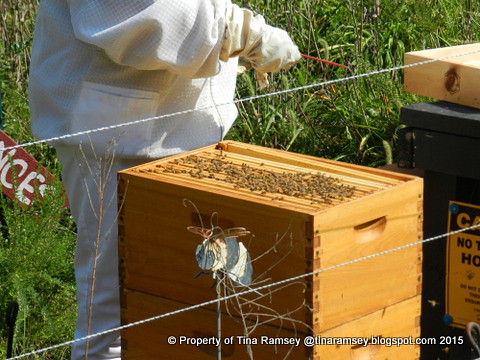
Getting into the weaker hive is a lot less stressful because there are not as many bees and because these bees are nicer. After removing the top cover, the feeder, and the inner cover this is the amount of bees I find. As compared to the stronger hive this is a stark difference in bee numbers. Checking this hive goes a lot faster and I am quite happy to find brood on the frames.
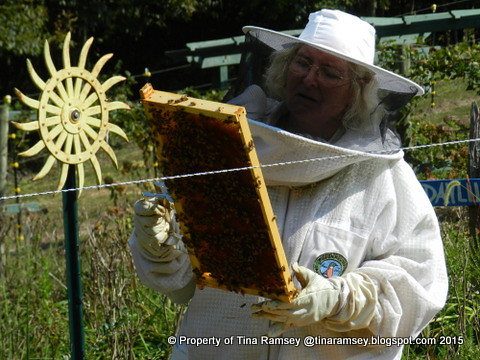
Observing the bees and the baby bees is really fascinating. You can hardly tell it is 90 degrees and I am wearing multiple layers of clothing can you? As much as I am fascinated by the bees I try to do my business and get out of the suit just as fast as I can. The whole process takes me about 45 minutes and it sometimes seems like it is over in two minutes! I check my hives about every two weeks and other than feeding them for about a week in the spring and also about a week last month I have not added anything to the hives nor have I tried to manipulate things. I guess I am lucky the bees have done well. As the days are getting shorter and the temperature begins to drop I am very worried about what winter will bring but for now this is a day in the beehive during the summer....
in the garden....
Tina, I read your post and I am just shaking my head in agreement the whole way through. I did get a ventilated jacket this year which has helped a little with the heat. The worst was when I would forget my glasses guard and my glasses would end up in my veil. I'll be going into my hives probably tomorrow and I can smell the honey right now, I just hope there will be a wee bit for me :) Take care and Thanks for being a beekeeper!
ReplyDeleteVery interesting post. We have thought about bees, but not sold on the obligation of it. My blooms are still quite sparse so it would not be a good spot for a hive.
ReplyDeleteImpressive! I'm pleased with the odds stacked against the bees that they have found a loyal new friend in you. It seems a natural extension to your garden to raise pollinators.
ReplyDeleteGood for you Tina. I think it is all interesting too. I don't have a place for them but I see a couple of honey bees in my garden every day. I don't know where they come from. They must come from afar. Right now the Flame goldenrod is blooming and they are enjoying that and the sedums of course. It will be fun to see how things go with your new interest.
ReplyDeleteLike Sarah said, this looks like a natural extension in your garden.
ReplyDeleteEach day you must be learning something new.
I SO admire your ambition :)
ReplyDeleteYou are a true Garden Hero for taking on this adventure! You look like a spacewoman in your bee suit. I am finding your bee keeping very fascinating and hope for a success in this venture as bees are the key to the doorway of a farm.... Good Luck and keep these posts coming....
ReplyDeleteThis was so interesting, Tina! I've read about beekeeping and have been to some talks by beekeepers, but I appreciate your honesty in the work entailed. I've got the space here, but I'm not sure I would want to take on such a big project. Plus, according to a local beekeeper, farm chemicals are always an issue around here. Glad your bees have found such a happy home!
ReplyDeleteThat was all so very interesting. I've had a declining hive of wild bees here since I moved in 1990 and have watched them swarm a couple times. My grandfather kept bees and my Dad helped him and told me a little about bee keeping. Of course this was all a loooong time ago and methods were not as sophisticated as they are now. I knew you had to feed bees and provide moisture but I never knew it involved opening the hives to do those things. I surely don't envy you wearing that suit. It looks like a cross between a NASA suite and something worn by the Storm Troopers on Star Wars;)
ReplyDeleteWell, you look cute in your bee clothes. :-) That would be hot. I had no idea you had to check on the hives so much. I figured that the bees did their thing and then there was honey! Shows what I know. We have a local bee farm. I think I'll just buy honey from them at the market. Although, it has been a tough year for their bees they said. They're feeding them too. Now I know what they meant. Take care of you and the bees!
ReplyDelete